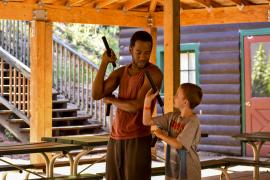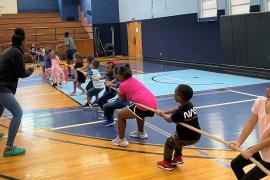The only thing certain about the world we live in is uncertainty. This was true before COVID-19 and will always be part of the human experience. Not reassuring, but 100-percent accurate. When it is hard to determine what to do next, the one thing that can be controlled in challenging times (or any time) is our response. Often, we need to reflect on where we’ve been to develop a plan for where we are going (even though the future is unknown). Here we offer thoughts on avoiding panic leadership, understanding our stress, and returning to our values, so we can act instead with confidence for continuous growth amidst uncertainty. In our own exploration of this, we follow a path back to the basics. Anything else complicates an already complicated situation.
Panic Is Real
In recent months we have noticed this sense of being “stuck” within the camp community. All default systems and timelines seem useless right now. Hands go up in the air and folks wonder what should be done to build next year’s staff team. What experience are we selling to the staff? Is it fair to sell the 2019 experience and then change it before camp if things don’t start heading back toward normal? If we sell the 2020 or 2021 experience, are too many staff going to self-select out due to too much work or fear? How do we mitigate the potential lack of international staff? Should we have staff start over with applications, references, etc., if they were hired last spring but never worked? The list goes on and on. The overwhelming feel of panic or fear goes up and up.
Under normal circumstances, we find ourselves in panic mode in March, April, and May. We aren’t supposed to feel this way in the fall. This is new and strange. This time of year is usually spent taking a break to come off the recent summer and revel in its success. We all (staff included) need time to look back and take note of what went well and what can be improved for future seasons. So, we send staff home or to school and begin to reconnect and re-engage with them once there is some distance between the past camp season and the upcoming one.
“The pandemic has hijacked the circumstances of our lives — that’s the reality we can’t avoid. But our minds and our reactions are still our own.” – Eric Weiner
Unfortunately, when we panic, especially if prematurely, we are easily distracted. We tend to veer away from the very path where we need to be. In uncertain times (right now), it is even more important to look toward the direction we want to go. In the few instances when I have been horseback riding, one of the key instructions I remember is to “to keep your head up and eyes focused in the direction you want the horse to take you.” This is true in biking as well. Jolly will tell you that she was reminded of this firsthand as she was cheering on a friend behind her on a switchback. As she looked over her shoulder to give words of encouragement, she was derailed on her course and took a tumble (and wound up with a broken arm).
Staff Culture = Camp Culture
When in panic mode, everything — vision, focus, confidence, routines, courage, hope (you name it) — goes out the window. Paralysis often sets in, and it becomes almost impossible to move with confidence toward the desired culture. It is important to know that we believe staff culture and camp culture are tied together. They are not separate. The culture your staff embraces and models is your camp culture. No big deal, right? Ha!
It is a big deal. Your existence depends on it. Thus, your mind races, your palms begin to sweat, your heart starts beating a little faster, your stomach is in knots, restful sleep is hard to come by, and chocolate becomes your best friend.
Then you remember to take a slow deep breath. Inhale. Hold. Exhale. Hold. Followed by another one. Breathe in. Hold. Breathe out. Hold. Now one more. Expand your lungs as much as possible. Now slowly blow it all out….
Feeling better? We hope so! Taking slow deep breaths is a simple act that can bring back a sense of calm when things feel like they are slipping out of control. Find comfort in knowing that there is also power in yet. As we prepare to build our staff team for next summer, we don’t have to know it all yet. We are not expected to have all the answers on how COVID-19 will impact camp operations yet. We do not need to have clarity on what the summer is going to look like for staff yet.
Yet is a small but mighty word. It allows us to take a step back and gain a new perspective that frees us from staying rooted in our “old normal.” Now, let your shoulders come down from your ears. Give those tense muscles permission to relax. Let’s see where all of this stress is coming from!
Be a Stress Detective
To be able to focus our energy on our putting/keeping our values in action as we plan for next summer, we must be aware of what knocks us off course. Usually we talk about being a “stress detective” with regard to your staff to determine any barriers that may be getting in the way of their success. This time we encourage you to think about the stressors you are personally facing at the moment. What is getting in your way of being able to move forward? Recognize the stresses hitting you between the eyes right now are most likely different than in other times.
“Never let fear (aka panic) prevent you from doing what you know is right.”
– Auung San Suu Kyi
The good news is that, if we pay attention, stress can be a dashboard light and inform or remind us of what is important (and connected to our values). By taking inventory and being self-aware, we are able to realize there is something important worth our attention.
- Are there any stressors that can be learned from or reduced?
- Personal health or health of family/friends?
- Working from home with/out other family members?
- Responsibility for children’s education at home/school?
- Distractions?
- Understaffed in the off-season?
- Team members let go or furloughed?
- Minimal operating budget?
- Information that is constantly changing or varies by location?
- What are your unmet needs?
- Personal time/space?
- Childcare?
- Financial restrictions?
- Lack of a real deadline (we will let you know when we know)?
- Are there necessary skills you do not currently have?
- Is there any low hanging fruit that can be learned by taking a class or webinar?
- Is there someone on your team who can fill in those gaps?
Which of these stress points are in your control? What can be done to give relief (even if just a little)? Are there any contributors to stress that are completely out of your control? Can you let them go or ask for help to manage them?
Return to Your Values
Identifying our stress helps acknowledge where energy is being spent at the moment. This can take our vision away from where we want to go and create a false sense of what we think our priorities should be. Taking time to be a stress detective will hopefully alleviate some of the pressure and pre-work to keep our values front and center in our leadership and decision-making. This will create a roadmap to keep our values in line throughout the process of planning for the summer.
In three words, describe your staff/camp culture (before, during and after the pandemic):
|
What it used to be like |
What it is currently |
Where you want it to be |
|
1. 2. 3. |
1. 2. 3. |
1. 2. 3. |
Has this changed from the past? If so, how? What will it take to get back on track if not going on the desired path? Even before COVID-19, a return to our values puts down an anchor and acts as a compass to give us direction on where we are heading (crisis or not). Ironically, culture also reflects the “inaction” (one word) of values — if we are stuck and not putting our values to work, we go nowhere. Staff can sense this hesitation and will have a hard time getting on board and buying into the upcoming camp season — whatever that may be.
“We’re going to grow our way out of here.” – David Marshall
In Part Two, we will invite you to use this uncertain time to take the values identified above and put them “in action” (two words) to frame, invoke, define, and redefine the current (or any) crisis. This will make it easier to bring your staff on board and commit to a different summer while creating the culture your camp needs.
This blog was written as part of Project Real Job’s initiative to support camps with staff recruiting, hiring, and retention efforts.
Photo courtesy of Camp Tallchief in Skiatook, Oklahoma
Kim Aycock, MST, has 35+ years of experience developing young people with skills robots are unable to do. While blending the talents of a master teacher with the knowledge of a seasoned camp expert, Kim ignites the learning for varying levels of campers and staff worldwide (both in person and virtually). She has the ability to connect with and motivate learners of all ages through her interactive and innovative presentations. Kim speaks professionally at regional and national conferences, contributes regularly to Camping Magazine and ACA blogs, and serves as co-chair of ACA’s Project Real Job Committee. More information can be found at: kimaycock.com.
Jolly Corley, MS, works each summer developing 120 emerging leaders to create a dynamic and thoughtful camp culture through staff development. Using games, theatre, and life experiences, she prepares staff to understand that our own experiences are the most useful tools for reflection and growth to a solid foundation in becoming leaders for life. Her work takes her around the world providing training to develop a staff culture that promotes personal and professional growth. Check out jollycorley.com for more information.
The views and opinions expressed by contributors are their own and do not necessarily reflect the views of the American Camp Association or ACA employees.



